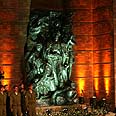
Holocaust Martyrs and Heroes Memorial Day was commemorated in the Hebrew Union College concert series on April 21, 2009 with “Letters Weeping in Fire”, an evening of songs by three Israeli composers to poetry of Jacob Barzilai (b.1933). A Holocaust survivor himself, Barzilai divides his time between writing, lecturing and reading his poetry, much of which has been set to music, at public concerts. Shimrit Carmi-soprano and Hadas Gur-mezzo-soprano were accompanied on the piano by Monica Fallon and Anastasia Sobolev.
The concert opened with Anastasia Sobolev’s reflective and delicately paced playing of a piece from Paul Ben-Haim’s (1897-1984) “Music for Piano, 1967”. Sobolev, a graduate of the Kemerovo College of Music and the Novosibirsk Glinka Conservatory, immigrated to Israel in 1998, continuing her studies at the Jerusalem Rubin Academy of Music. She performs as a soloist and in chamber ensembles.
Barzilai preceded each new group of songs with his own thought-provoking reading of the poems, giving the audience time to peruse the words (provided with English translation) before hearing the songs.
The first set of songs was composed by Yoram Meyuchas (b.1967, Israel), with texts taken from Barzilai’s book titled “Not All Is Black and Not Always”. Meyuchas has written much vocal music, is first violist in the Haifa Symphony Orchestra, teaches viola, lectures on music repertoire and coaches young chamber music players. Performed by soprano Shimrit Carmi and Monica Fallon (piano), the song cycle uses contemporary melodic lines and textures to depict the moving in and out of memory.
‘I have grown tired
Of day to day struggling
In the space separating
Remembrance from forgetfulness
Bluntness from transparency,
Even though I do try
To remember that one must not forget.’ (English translation: Elisheva Gal.)
Carmi, a pianist and accompanist, is especially interested in the German Lied. Her voice is delicate but she is convincing and convinced, the text in her hands is visual and personal, conveying the poetry’s powerful and bleak message. Meyuchas’ writing for the piano provides Fallon with a rich canvas and she handles it well. Fallon performs chamber music, accompanies and coaches cantorial students at Hebrew Union College and lectures in Israeli art music. She runs the Hebrew Union College concert series.
The second group of songs was from Barzilai’s book “Letters Weeping in Fire”, set by Aharon Harlap (b.1941. Canada). Pianist, conductor and composer, Harlap has written works for choir, chamber ensembles and orchestra. We heard mezzo-soprano Hadas Gur and Anastasia Sobolev in the performance of these songs. Behind the song cycle lies a quotation from a play of Heinrich Heine (1797-1856): “They who start by burning books will end up burning men”. We are presented with a vivid and uncompromising set of scenes and thoughts, almost visual, as in the cynical victory march in “Fire in the Town Square”, the drunken march in “Brave Soldier” and the innocence of children’s games as presented by the piano in “Forbidden Games”. Hadas Gur fills the scene with dramatic depth, her voice changing with each gesture and she singles out and colors certain words of the text. The piano part is highly demanding and descriptive; Sobolev spells out small recurring motifs and joins Gur in painting each picture. Gur is a Baroque specialist, singing in the “Gaechinger Kantorei” under Helmuth Rilling. She also premieres contemporary Israeli works.
The concert ended with two songs from “Longing for my Father”, performed by Carmi and Fallon. The music composed to this is by Rami Bar-Niv (b.1951, Israel.) Bar-Niv, a highly acclaimed pianist, has performed widely and is the recipient of several prizes. Barzilai was eleven years old when he lost his father; Bar-Niv cushions these his poems in a lush, tonal, Romantic and cantabile style, the music combining Jewish motifs with interesting harmonic ideas, the texts combining past and present.
‘When I faced the rock of the lost in Jerusalem,
Inquiring about my loss,
I was not answered.’ (Translation: Rami Bar-Niv.)
This was an interesting and meaningful event for Holocaust Martyrs and Heroes Memorial Day, a concert of fine performance by artists who had clearly delved deeply into the subject matter.















